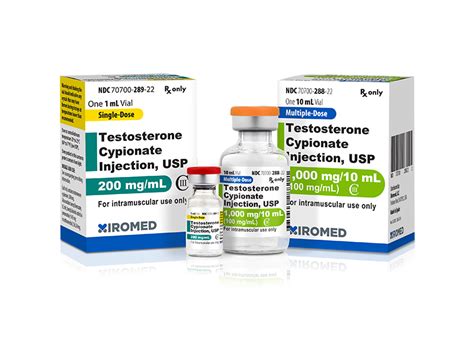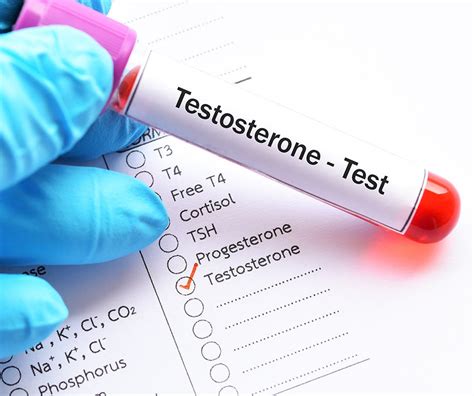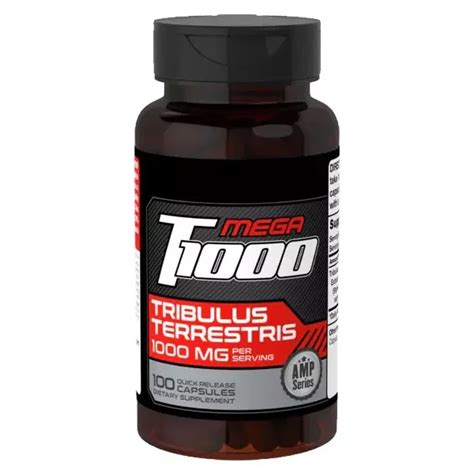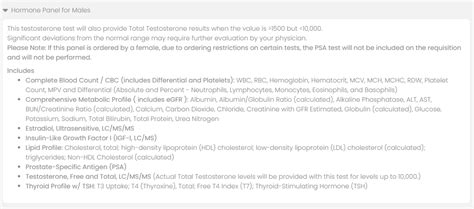Intro
Learn about Testosterone Blood Test, a diagnostic tool for low testosterone levels, hypogonadism, and hormonal imbalance, using lab tests to measure free testosterone and total testosterone levels.
The importance of hormone balance in the human body cannot be overstated. One of the key hormones responsible for various bodily functions, particularly in men, is testosterone. Often referred to as the "male hormone," testosterone plays a crucial role in the development of male reproductive tissues, the promotion of secondary sexual characteristics, and the influence on overall health and well-being. However, when testosterone levels become imbalanced, it can lead to a variety of health issues, making the monitoring of testosterone levels through a blood test a vital diagnostic tool. Understanding the significance of testosterone and the process of a testosterone blood test can empower individuals to take proactive steps in managing their health.
Testosterone affects not only physical attributes but also emotional and mental states. Its imbalance can lead to symptoms such as fatigue, decreased libido, erectile dysfunction, and mood changes. Given the wide range of effects testosterone has on the body, recognizing the signs of imbalance and seeking medical evaluation is crucial. A testosterone blood test, also known as a serum testosterone test, is a simple yet effective method to determine the levels of testosterone in the blood. This test is often recommended for individuals experiencing symptoms of low testosterone or those undergoing treatment for conditions related to testosterone imbalance.
The process of undergoing a testosterone blood test is straightforward and relatively quick. A healthcare provider will typically draw blood from a vein in the arm, which is then sent to a laboratory for analysis. The test measures the total testosterone level in the blood, including both free testosterone (the amount of testosterone that is not bound to proteins in the blood) and bound testosterone (the amount of testosterone attached to proteins). Understanding the results of the test requires the interpretation of a healthcare professional, as normal testosterone levels can vary among individuals and are influenced by factors such as age, sex, and the time of day the test is taken.
Understanding Testosterone

Testosterone is a steroid hormone produced primarily in the testes in males and in smaller amounts in the ovaries in females, with both sexes also producing it in the adrenal glands. It is essential for the development of male characteristics and reproductive organs, as well as for maintaining muscle mass, bone density, and sex drive. The production of testosterone is regulated by a complex system involving the hypothalamus, pituitary gland, and testes, ensuring that levels remain within a narrow, healthy range. However, factors such as aging, obesity, certain medical conditions, and the use of some medications can disrupt this balance, leading to either hypogonadism (low testosterone) or hypergonadism (high testosterone).
Benefits of Balanced Testosterone Levels
Balanced testosterone levels are crucial for overall health, contributing to: - Enhanced muscle mass and strength - Improved bone density, reducing the risk of osteoporosis - Healthy libido and sexual function - Better mood and reduced risk of depression - Improved cognitive function - Enhanced athletic performanceTestosterone Blood Test Procedure

The procedure for a testosterone blood test is minimally invasive and typically involves the following steps:
- Preparation: Patients may be asked to fast for a certain period before the test, although this is not always required. It's also important to inform the healthcare provider about any medications or supplements being taken.
- Blood Draw: A healthcare professional will clean the area where the blood will be drawn, usually from a vein in the arm, and then insert a needle to collect a blood sample into a test tube.
- Sample Analysis: The blood sample is sent to a laboratory where the testosterone levels are measured.
- Results Interpretation: The healthcare provider will interpret the results, considering factors such as the patient's age, symptoms, and medical history.
Interpreting Test Results
The interpretation of testosterone blood test results requires careful consideration of various factors, including: - **Reference Range**: The normal range for testosterone levels can vary between laboratories but is generally considered to be approximately 300 to 1,000 ng/dL for adult males and 15 to 70 ng/dL for adult females. - **Symptoms**: The presence and severity of symptoms related to testosterone imbalance. - **Medical History**: Existing medical conditions and the use of certain medications can influence testosterone levels.Causes of Testosterone Imbalance

Testosterone imbalance can result from a variety of factors, including:
- Aging: Testosterone levels naturally decline with age, particularly after the age of 40.
- Obesity: Excess body fat can lead to lower testosterone levels.
- Certain Medical Conditions: Such as hypogonadism, pituitary gland problems, and testicular cancer.
- Medications: Certain drugs, including opioids, glucocorticoids, and some antidepressants, can affect testosterone production.
- Lifestyle Factors: Lack of sleep, excessive stress, and poor diet can also contribute to testosterone imbalance.
Treatment Options for Testosterone Imbalance
Treatment for testosterone imbalance depends on the underlying cause and may include: - **Testosterone Replacement Therapy (TRT)**: For individuals with low testosterone, TRT can help restore normal levels. - **Lifestyle Changes**: Improving diet, increasing physical activity, managing stress, and ensuring adequate sleep can help naturally boost testosterone levels. - **Medications**: In some cases, medications may be prescribed to address underlying conditions contributing to the imbalance.Prevention and Management

Preventing and managing testosterone imbalance involves a combination of lifestyle modifications and, when necessary, medical interventions. Key strategies include:
- Regular Exercise: Engaging in physical activity, especially resistance training, can help maintain healthy testosterone levels.
- Healthy Diet: Consuming a diet rich in proteins, healthy fats, and certain nutrients like zinc and vitamin D can support testosterone production.
- Stress Management: Techniques such as meditation, yoga, and deep breathing exercises can help reduce stress levels.
- Adequate Sleep: Ensuring 7-9 hours of sleep per night is crucial for maintaining hormonal balance, including testosterone.
Natural Testosterone Boosters
Certain natural supplements and nutrients have been suggested to help boost testosterone levels, including: - **Vitamin D**: Essential for overall health and has been linked to healthy testosterone levels. - **Magnesium**: Plays a role in testosterone production and can help improve sleep quality. - **Zinc**: A mineral that is crucial for the production of testosterone. - **Ashwagandha**: An herb that may help reduce stress and improve testosterone levels.Conclusion and Next Steps

In conclusion, maintaining balanced testosterone levels is vital for overall health and well-being. Through a combination of lifestyle changes, dietary adjustments, and when necessary, medical treatment, individuals can take proactive steps to manage their testosterone levels. If you're experiencing symptoms of testosterone imbalance, consulting with a healthcare provider is the first step towards diagnosis and treatment. By understanding the importance of testosterone and taking an active role in health management, individuals can work towards achieving and maintaining optimal hormone balance.
We invite you to share your thoughts and questions about testosterone health in the comments below. For those seeking more information on how to manage testosterone levels naturally or through medical interventions, we encourage you to explore reputable health resources and consult with healthcare professionals. Sharing this article with others who may benefit from this information is also appreciated, as raising awareness about the importance of hormone balance can help foster a community of support and health empowerment.
What is the normal range for testosterone levels in adult males?
+The normal range for testosterone levels in adult males is approximately 300 to 1,000 ng/dL, though this can vary between laboratories.
Can lifestyle changes help improve testosterone levels?
+Yes, lifestyle changes such as regular exercise, a healthy diet, stress management, and adequate sleep can help support healthy testosterone levels.
What are the symptoms of low testosterone in men?
+Symptoms of low testosterone in men can include decreased libido, erectile dysfunction, fatigue, mood changes, and decreased muscle mass and bone density.
